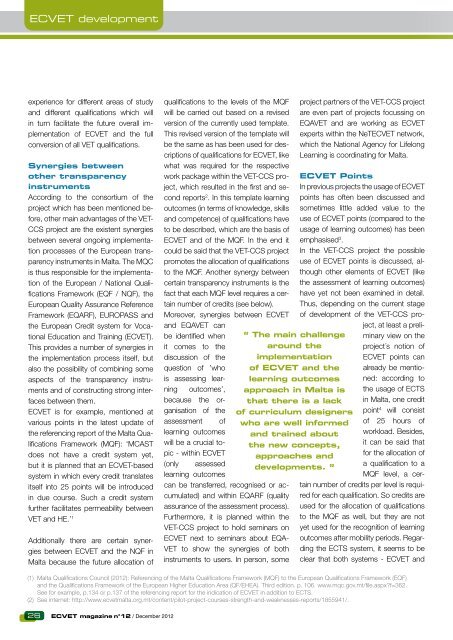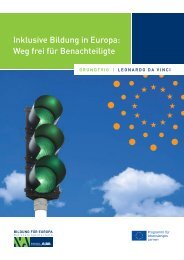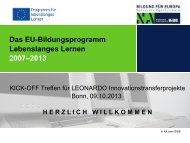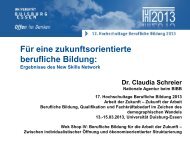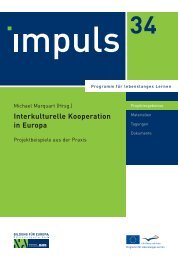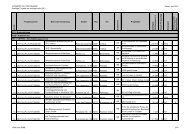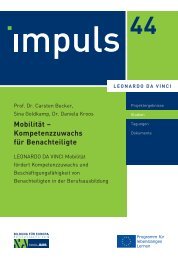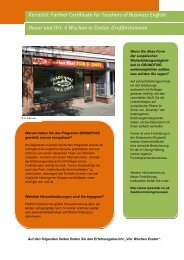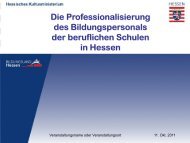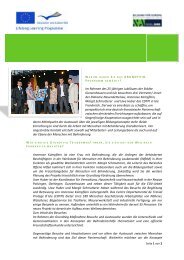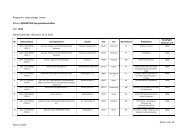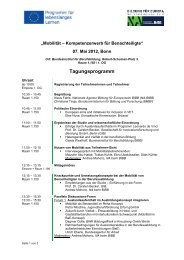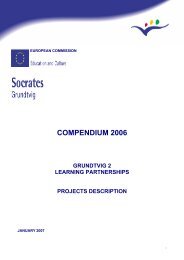You also want an ePaper? Increase the reach of your titles
YUMPU automatically turns print PDFs into web optimized ePapers that Google loves.
ECVET development<br />
experience for different areas of study<br />
and different qualifications which will<br />
in turn facilitate the future overall implementation<br />
of ECVET and the full<br />
conversion of all VET qualifications.<br />
Synergies between<br />
other transparency<br />
instruments<br />
According to the consortium of the<br />
project which has been mentioned before,<br />
other main advantages of the VET-<br />
CCS project are the existent synergies<br />
between several ongoing implementation<br />
processes of the European transparency<br />
instruments in Malta. The MQC<br />
is thus responsible for the implementation<br />
of the European / National Qualifications<br />
Framework (EQF / NQF), the<br />
European Quality Assurance Reference<br />
Framework (EQARF), EUROPASS and<br />
the European Credit system for Vocational<br />
Education and Training (ECVET).<br />
This provides a number of synergies in<br />
the implementation process itself, but<br />
also the possibility of combining some<br />
aspects of the transparency instruments<br />
and of constructing strong interfaces<br />
between them.<br />
ECVET is for example, mentioned at<br />
various points in the latest update of<br />
the referencing report of the Malta Qualifications<br />
Framework (MQF): ‘MCAST<br />
does not have a credit system yet,<br />
but it is planned that an ECVET-based<br />
system in which every credit translates<br />
itself into 25 points will be introduced<br />
in due course. Such a credit system<br />
further facilitates permeability between<br />
VET and HE.’ 1<br />
Additionally there are certain synergies<br />
between ECVET and the NQF in<br />
Malta because the future allocation of<br />
qualifications to the levels of the MQF<br />
will be carried out based on a revised<br />
version of the currently used template.<br />
This revised version of the template will<br />
be the same as has been used for descriptions<br />
of qualifications for ECVET, like<br />
what was required for the respective<br />
work package within the VET-CCS project,<br />
which resulted in the first and second<br />
reports 2 . In this template learning<br />
outcomes (in terms of knowledge, skills<br />
and competence) of qualifications have<br />
to be described, which are the basis of<br />
ECVET and of the MQF. In the end it<br />
could be said that the VET-CCS project<br />
promotes the allocation of qualifications<br />
to the MQF. Another synergy between<br />
certain transparency instruments is the<br />
fact that each MQF level requires a certain<br />
number of credits (see below).<br />
Moreover, synergies between ECVET<br />
and EQAVET can<br />
be identified when<br />
it comes to the<br />
discussion of the<br />
question of ’who<br />
is assessing learning<br />
outcomes’,<br />
because the organisation<br />
of the<br />
assessment of<br />
learning outcomes<br />
will be a crucial topic<br />
- within ECVET<br />
(only assessed<br />
learning outcomes<br />
can be transferred, recognised or accumulated)<br />
and within EQARF (quality<br />
assurance of the assessment process).<br />
Furthermore, it is planned within the<br />
VET-CCS project to hold seminars on<br />
ECVET next to seminars about EQA-<br />
VET to show the synergies of both<br />
instruments to users. In person, some<br />
“ The main challenge<br />
around the<br />
implementation<br />
of ECVET and the<br />
learning outcomes<br />
approach in Malta is<br />
that there is a lack<br />
of curriculum designers<br />
who are well informed<br />
and trained about<br />
the new concepts,<br />
approaches and<br />
developments. ”<br />
project partners of the VET-CCS project<br />
are even part of projects focussing on<br />
EQAVET and are working as ECVET<br />
experts within the NeTECVET network,<br />
which the National Agency for Lifelong<br />
Learning is coordinating for Malta.<br />
ECVET Points<br />
In previous projects the usage of ECVET<br />
points has often been discussed and<br />
sometimes little added value to the<br />
use of ECVET points (compared to the<br />
usage of learning outcomes) has been<br />
emphasised 3 .<br />
In the VET-CCS project the possible<br />
use of ECVET points is discussed, although<br />
other elements of ECVET (like<br />
the assessment of learning outcomes)<br />
have yet not been examined in detail.<br />
Thus, depending on the current stage<br />
of development of the VET-CCS pro-<br />
ject, at least a preliminary<br />
view on the<br />
project´s notion of<br />
ECVET points can<br />
already be mentioned:<br />
according to<br />
the usage of ECTS<br />
in Malta, one credit<br />
point 4 will consist<br />
of 25 hours of<br />
workload. Besides,<br />
it can be said that<br />
for the allocation of<br />
a qualification to a<br />
MQF level, a certain<br />
number of credits per level is required<br />
for each qualification. So credits are<br />
used for the allocation of qualifications<br />
to the MQF as well, but they are not<br />
yet used for the recognition of learning<br />
outcomes after mobility periods. Regarding<br />
the ECTS system, it seems to be<br />
clear that both systems - ECVET and<br />
(1) Malta Qualifications Council (2012): Referencing of the Malta Qualifications Framework (MQF) to the European Qualifications Framework (EQF)<br />
and the Qualifications Framework of the European Higher Education Area (QF/EHEA). Third edition. p. 106. <strong>www</strong>.mqc.gov.mt/file.aspx?f=362.<br />
See for example, p.134 or p.137 of the referencing report for the indication of ECVET in addition to ECTS.<br />
(2) See internet: http://<strong>www</strong>.<strong>ecvet</strong>malta.org.mt/content/pilot-project-courses-strength-and-weaknesses-reports/1855941/.<br />
26 ECVET magazine n°12 / December 2012


